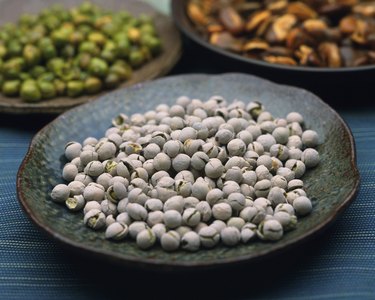
Also known as the navy bean, fagioli or pea bean, the white pea is a classic choice for baked beans or soups. The small- to medium-sized white legumes became known as "navy beans" after sailors stationed overseas, and longing for traditional baked beans, discovered white peas to be perfect for Yankee dishes such as baked beans. Creamy and mild, white peas take up to two hours to cook. They are also readily available in cans for quick but healthy meals.
Nutrition
Video of the Day
Navy beans top the list of fiber-rich legumes, offering 19 g of fiber per cup, which is about half of the daily recommended amount of fiber, notes the Linus Pauling Institute at Oregon State University. The beans are also a good source of protein, at 16 g per cup. The white pea also provides at least a quarter of the daily recommended amounts of thiamin, folic acid, iron, copper, potassium, phosphorus, manganese and magnesium. A 1-cup serving of beans contains 255 calories and 1.1 g fat.
Video of the Day
Benefits
Packing an iron punch, white peas come to the rescue for people at risk for iron deficiencies, according to the Centers for Disease Control and Prevention. Young children, pregnant women, women with heavy menstrual cycles and people who suffer heavy blood loss from injury or disease are all at risk of developing an iron deficiency, which causes fatigue and weakness. Paired with grains to round out the amino acid content, navy beans provide a complete protein that is less expensive and lower in fat than many animal-based products. In fact, legumes such as the white pea are useful to vegetarians and vegans looking for nonanimal protein sources. Finally, the fiber rich-white pea is a weight loss boon because it promotes proper digestion and makes you feel full more quickly than many other foods, yet it is low in calories and saturated fat. The high-fiber content is also helpful for people watching their cholesterol levels.
Drawbacks
Some people may have trouble breaking down compounds in legumes known as purines. When that happens, the body produces too much uric acid, which can lead to kidney stones or gout. If you are prone to either of these conditions, ask your physician whether you should cut back on your consumption of foods like white peas, fish, wine and beer. More commonly, dried peas and beans cause flatulence in some people. You may find it helpful to take an over-the-counter gas-reducing supplement. Soaking the beans for a day or two to sprout them slightly before cooking may also reduce gas buildup, notes the University of Utah Cooperative Extension.
Uses
Add white peas to chili or use for baked beans. Pair either dish with corn bread to make a complete protein serving. Other bean and grain suggestions including spreading white peas pureed with olive oil and garlic on whole-wheat pita bread, using white peas and noodles in a minestrone-like soup, tossing white peas into a chilled pasta salad or topping rice or other grains with white peas and cooked vegetables.
- Utah State University Cooperative Extension: Dry Beans and Peas
- Linus Pauling Institute; Fiber; Jane Higdon, Ph.D.; Dec 2005
- Centers for Disease Control and Prevention: Iron and Iron Deficiiency
- University of Maryland Medical Center: Uric Acid
- USDA Nutrient Database: Beans, Navy, Mature Seeds, Cooked, Boiled, Without Salt
- Idaho Bean Commission: Varieties
- Cooks Thesaurus: Dry Beans